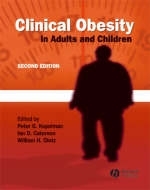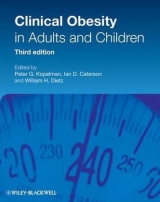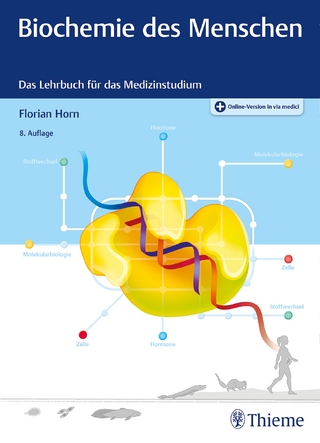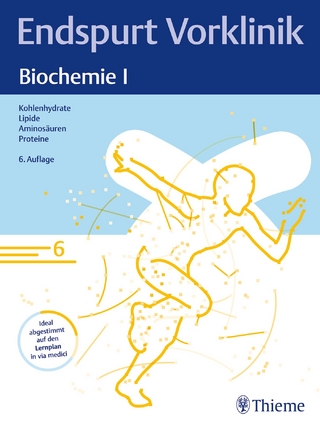
Clinical Obesity in Adults and Children
Blackwell Publishing Ltd (Verlag)
978-1-4051-1672-5 (ISBN)
- Titel ist leider vergriffen;
keine Neuauflage - Artikel merken
This title is highly commended in the 2006 British Medical Association Book Awards (Endocrinology). This second edition brings together more than 20 internationally recognized experts in the field to provide a timely review of current knowledge. The text remains an invaluable resource for all healthcare professionals involved in the care of patients who are obese. New features of this second edition include: addition of two new co-editors - Professor Bill Dietz, USA and Professor Ian Caterson, Australia, and increased number of contributors from around the globe - providing a truly international perspective. This title includes new information about the causes of obesity, its complications and new (and novel) methods of prevention and treatment. It is reorganized into sections that address obesity and its social and cultural aspects, biology, associated diseases, life stages (pediatric and adult), management, and environmental and policy approaches.
Professor Peter Kopelman is Professor of Clinical Medicine at Barts and The London, Queen Mary's School of Medicine and Dentistry, University of London, and an Honorary Consultant Physician to Barts and The London NHS Trust. He is also the Deputy Warden of the School of Medicine. Professor Kopelman has a long-standing interest in diabetes care and initiated a district-wide scheme for integrated care in East London. He established an Obesity Clinic at the Royal London Hospital in 1980 that now has a national reputation and receives referrals from around the United Kingdom. The clinic focuses particularly on patients with extreme obesity and those with lesser degrees of obesity but who have developed complications as a consequence of the condition. Professor Kopelman's major research interest is in the field of obesity, in particular endocrine aspects and possible genetic determinants. He is also interested in the pathophysiology of associated complications and their management. Professor Kopelman is a past chairman of the Association for the Study of Obesity, President of the European Association for the Study of Obesity, a Trustee of the International Association for the Study of Obesity and a member of the Department of Health and Food Standards Agency Scientific Advisory Committee on Nutrition. Professor Kopelman is a member of the Chief Medical Officer's Working Group on physical activity. He is chairman of the Royal College of Physicians Committee on Nutrition and chaired the College's Working Party on the management of obesity with particular reference to drug therapy. He also chaired the College's Working Party on nutritional care of patients that resulted in the publication of a report entitled 'Nutrition and Patients - a Doctor's Responsibility" Professor Ian Caterson is a recognised international expert on obesity. Research areas include insulin resistance, the cause and consequences of obesity and the foetal origins of disease. As well he is an acknowledged expert on the Metabolic Syndrome and is looking at better definitions of this syndrome and whether there are specific ethnic differences. He is Past President of Australian Diabetes Society and of Australasian Society for the Study of Obesity and is currently Regional Vice-President, International Association for the Study of Obesity, Member, Scientific Council, International Obesity Task Force, Co-Director NSW Centre for Overweight & Obesity, NSW Centre for Public health Nutrition. He is also the Obesity Editor for the journal Diabetes, Obesity and Metabolism. Professor William Dietz is Director of the Division of Nutrition and Physical Activity in the Center for Chronic Disease Prevention and Health Promotion at the CDC. Before his CDC appointment, he was Professor of Pediatrics at the Tuft's University School of Medicine, and Director of Clinical Nutrition at the Floating Hospital of New England Medical Center Hospitals. Dr. Dietz's research has focused on the epidemiology of childhood obesity, the clinical consequences of childhood and adolescent obesity, optimal dietary therapy for overweight children and adolescents, and the implications of reduced energy expenditure for the development of overweight in children and adolescents. He is the author of over 150 publications in the scientific literature, and the editor of three books, including A Guide to Your Child's Nutrition.
Preface to Second Edition.Part 1: Obesity.1. Epidemiology - Definition and Classification of Obesity.2. Measuring Body Composition in Adults and Children.3. Social Consequences of Obesity.4. Obesity and Culture.Part 2: Biology of Obesity.5. Energy Balance and Body Weight Homeostasis.6. Genes and Obesity.7. Fetal and Infant Origins of Obesity.8. Metabolic Fuels and Obesity: Carbohydrate and Lipid Metabolism in Skeletal Muscle and Adipose Tissue.9. Energy and Macronutrient Needs in Relation to Substrate Handling in Obesity.10. Biology of Obesity: Eating Behaviour.11. Energy Expenditure in Humans: The Influence of Activity, Diet and the Sympathetic Nervous System.Part 3: Obesity and Disease.12. Obesity and Dislipidaemia: Importance of Body Fat Distribution.13. Obesity and Disease: Insulin Resistance, Diabetes, Metabolic Syndrome and Polycystic Ovary Syndrome.14. Obesity and Disease: Hormones and Obesity.Part 4: Childhood Obesity.15. Childhood Obesity: Definition, Classification and Assessment.16. Childhood Obesity: Consequences and Physical and Psychosocial and Complications.Part V: Adult Obesity.17. Adult Obesity: Metabolic Syndrome, Diabetes and Non-Alcoholic Steatohepatitis.18. Cardiovascular Consequences of Obesity.19. Adult Obesity: Fertility.20. Obstructive Sleep Apnoea.Part 6: Management.21. An Overview of Obesity Management.22. Dietary Management of Obesity: Eating Plans.23. Behavioural Treatment of Obesity: Achievements and Challenges.24. Exercise and Obesity.25. Management of Obesity: Pharmacotherapy.26. The Management of Obesity: Surgery.27. Weight Loss Maintenance.28. Education and Training Health-Care Professionals.Part VII: Environmental and Policy Approaches.29. Obesity in Asian Populations.30. Environmental and Policy Approaches: Alternative Methods.31. A Comprehensive Approach to Obesity Prevention.Index.
| Erscheint lt. Verlag | 1.7.2005 |
|---|---|
| Zusatzinfo | 310 illustrations |
| Verlagsort | Oxford |
| Sprache | englisch |
| Maße | 221 x 274 mm |
| Gewicht | 1390 g |
| Themenwelt | Medizin / Pharmazie ► Medizinische Fachgebiete ► Pädiatrie |
| Studium ► 1. Studienabschnitt (Vorklinik) ► Biochemie / Molekularbiologie | |
| ISBN-10 | 1-4051-1672-2 / 1405116722 |
| ISBN-13 | 978-1-4051-1672-5 / 9781405116725 |
| Zustand | Neuware |
| Informationen gemäß Produktsicherheitsverordnung (GPSR) | |
| Haben Sie eine Frage zum Produkt? |
aus dem Bereich



